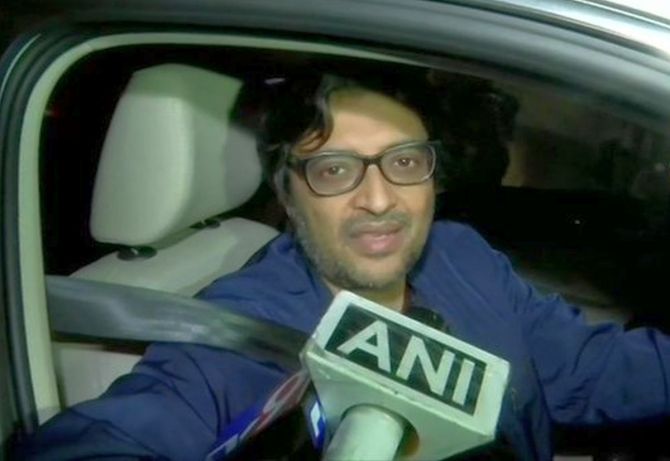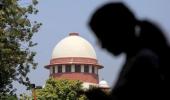The Supreme Court on Friday said the offence of abetment to suicide has not been established in a prima facie evaluation of the FIR against Editor-in-Chief of Republic TV Arnab Goswami and two others, and came down heavily on the Bombay high court, holding it "abdicated" its constitutional duty and function as a protector of liberty.

The top court made these observations in its verdict that extended the interim bail of the three accused till the high court decides their pleas for quashing of a 2018 abetment to suicide case, and for four weeks thereafter should it become necessary for all or any of them to take further recourse to their remedies in accordance with law.
"The writ of liberty runs through the fabric of the Constitution," the apex court said in a 55-page judgment after it granted interim bail to the accused on November 11. The court had then said it will be "travesty of justice" if personal liberty is curtailed.
A bench headed by Justice D Y Chandrachud on Friday gave detailed reasons in its verdict for granting relief to the TV anchor and two others. The three accused had approached the top court challenging the order of the Bombay high court denying them bail.
"It is the duty of courts across the spectrum - the district judiciary, the high courts and the Supreme Court - to ensure that the criminal law does not become a weapon for the selective harassment of citizens," said the bench that also comprised Justice Indira Banerjee.
The verdict dealt with various aspects such as power of high courts to grant bail under writ jurisdiction, quashing of an FIR and role of courts in upholding human liberty.
The top court said the Mumbai high court did not even prima facie evaluate the FIR against Goswami and said that the issue whether accused has established a case for quashing the FIR could have been looked into later, but the issue of bail should have been dealt with in the light of the complaint.
"We are clearly of the view that in failing to make even a prima facie evaluation of the FIR, the high court abdicated its constitutional duty and function as a protector of liberty. Courts must be alive to the need to safeguard the public interest in ensuring that the due enforcement of criminal law is not obstructed. The fair investigation of crime is an aid to it."
The top court was critical of the Bombay high court for not noticing the "disconnect" between the allegations against Goswami and others in the FIR and the pre-requisites of the penal provision on abetment to suicide.
"In this batch of cases, a prima facie evaluation of the FIR does not establish the ingredients of the offence of abetment of suicide under Section 306 of the IPC. The appellants are residents of India and do not pose a flight risk during the investigation or the trial. There is no apprehension of tampering of evidence or witnesses. Taking these factors into consideration, the order dated 11 November 2020 envisaged the release of the appellants on bail," it said.
While granting the relief, the top court said it was the duty of the courts to ensure that criminal law does not become a weapon for selective harassment and the high court, while exercising its writ power, should not "foreclose itself from the exercise of the power when a citizen has been arbitrarily deprived of their personal liberty in an excess of state power".
Stressing on the importance of personal liberty, the top court said, "Liberty across human eras is as tenuous as tenuous can be and becomes a casualty in the absence of vigilance by citizens, the cacophony of the media or observance of rule of law in the "dusty corridors of courts".
Goswami, Neetish Sarda and Feroz Mohammad Shaikh were arrested by Alibaug police in Maharashtra's Raigad district on November 4 in connection with the suicide of architect-interior designer Anvay Naik and his mother in 2018 over alleged non-payment of dues by companies of belonging to them.
Justice Chandrachud, writing the verdict for the bench, referred to various judgements to highlight the importance of personal liberty and the principle that "bail is rule and the jail is exception".
The top court said the FIR does not disclose the accused's commission of suicide as under section 306, they must have played an active role by an act of instigation or by doing certain act to facilitate the commission of suicide.
It said the High Court 'failed to apply its mind to a fundamental issue' which needed to be considered while dealing with a petition for quashing of an FIR.
"If the high court were to carry out a prima facie evaluation, it would have been impossible for it not to notice the disconnect between the FIR and the provisions of Section 306 of the IPC.
"The failure of the high court to do so has led it to adopting a position where it left the appellant to pursue his remedies for regular bail under Section 439 (of CrPC). The High Court was clearly in error in failing to perform a duty which is entrusted to it while evaluating a petition under Section 482 (CrPC) albeit at the interim stage," it said.
The apex court summarized important factors to be taken note of by the high courts in dealing with bail pleas and said "the nature of alleged offence, the nature of the accusation and the severity of the punishment in the case of a conviction" is one of them.
On the likelihood of the accused fleeing from justice, it said the antecedents of and circumstances which are peculiar to the accused should also be considered.
"It is our earnest hope that our courts will exhibit acute awareness to the need to expand the footprint of liberty and use our approach as a decision-making yardstick for future cases involving the grant of bail," it said.
The FIR alleged that Goswami's ARG Outlier Media Asianet News had not paid Rs 83 lakh for the Bombay Dyeing Studio project and in addition, there was Rs 4 crore outstanding from Feroz Shaikh and Rs 55 lakh from Sarda.
"The need to ensure the fair investigation of crime is undoubtedly important in itself, because it protects at one level the rights of the victim and, at a more fundamental level, the societal interest in ensuring that crime is investigated and dealt with in accordance with law. On the other hand, the misuse of the criminal law is a matter of which the High Court and the lower Courts in this country must be alive," the apex court said.











 © 2025
© 2025